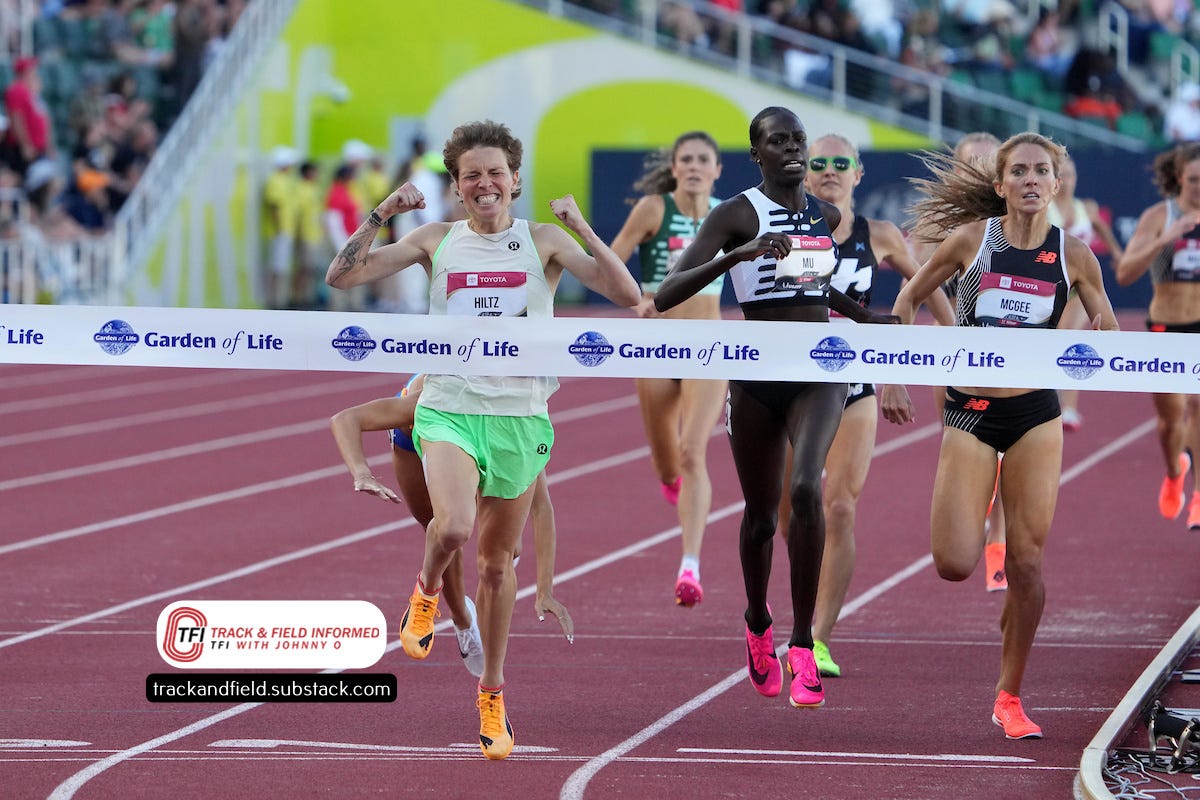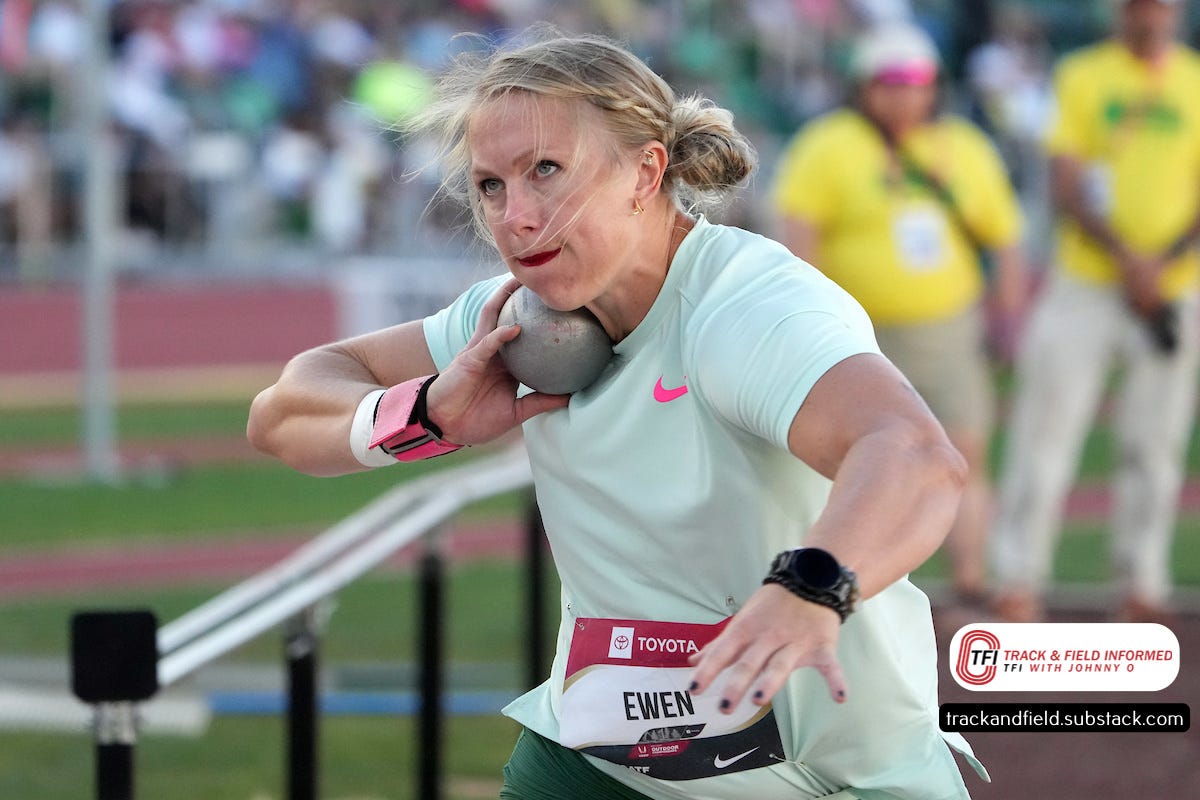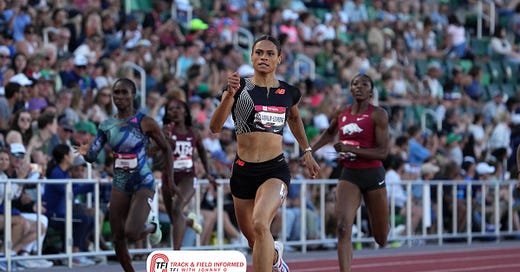Prodigious talent continues to blossom
McLaughlin-Levrone's latest one-lap masterpiece comes in 400 in USATF Champs

EUGENE, Oregon — For someone who readily admits that she still has a lot to learn when it comes to racing 400 meters, Sydney McLaughlin-Levrone looked like a seasoned veteran in rolling to the women’s title in the USA Track & Field Outdoor Championships at the University of Oregon’s Hayward Field on Saturday.
The four-time world-record setter in the women’s 400 hurdles took the lead in the first 75 meters of the race and was never seriously challenged for first place after that while on her way to a personal best and yearly world-leading time of 48.74 seconds.
The time was a meet record that lowered her previous best of 49.51 that she had set in winning the New York Grand Prix two weeks earlier. It also left her more than a second in front of runner-up Britton Wilson of the University of Arkansas, who ran 49.79. Defending champion Talitha Diggs of the University of Florida finished third in a personal best of 49.93 after struggling for much of the outdoor season.
McLaughlin-Levrone’s time moved her to 10th on the all-time world performer list and to second on the all-time U.S. list, on which she now sits just behind Sanya Richards-Ross’ 48.70 effort from 2006 and just in front of Valerie Brisco-Hooks’ 48.83 clocking that won the 1984 Olympic title at the Games in Los Angeles.
“I’m just getting use to [the 400] the more I run it,” McLaughlin-Levrone said. “I’m really happy with that time.”
McLaughlin-Levrone had run a barrier-busting 50.68 in winning the 400 hurdles in the World Athletics Championships at Hayward Field last July when she became the first — and thus far only — woman to break 51 seconds in the event. But she and her coach, Bobby Kersee, wanted to see what he could accomplish in the one-lap race — sans hurdles — during the first half of the outdoor season this year before deciding which event to run in the World Championships that will be held in Budapest, Hungary from Aug. 19-27.
The naysayers had come out in droves online when McLaughlin-Levrone finished second — in 49.71 — in the Meeting de Paris Diamond League meet on June 9 after she had tied up badly in the final 70 meters of the race. One had even written that while winner Marileidy Paulino of the Dominican Republic ran like a seasoned veteran, McLaughlin-Levrone “ran like a scared hare with its tail on fire.”
Knowing that she went out too quickly for the first 200 meters of the race in Paris, McLaughlin-Levrone had started more conservatively in the New York Grand Prix and that led to a stronger finish over the second half of the race.
Then came this week’s USATF meet in which she won her first-round heat in 49.79 on Thursday and her semifinal in 49.60 on Friday while clearly stepping off the accelerator in the final 50 meters of each race.
Wilson, who had set a collegiate record of 49.13 in the 400 in the Southeastern Conference Championships in mid-May, appeared to have made up a little bit of ground on McLaughlin-Levrone from the 150- to 250-meter mark of the race on Saturday. But she was no match for her in the home straightaway.
McLaughlin-Levrone’s finishing superiority could be seen in statistics on the meet website that showed she had a lead of .21 seconds over Wilson when she came through 200 meters in 23.24 and her advantage had increased five-fold when she crossed the finish line.
“Honestly, I was just looking for anything better than 49.5,” McLaughlin-Levrone said. “Obviously, making the team was the number one goal, then go for the win in that order, so I’m very happy… The plan was to go out and attack the first half and then come back strong in the back end.”
While the average age of McLaughlin-Levrone, Wilson, and Diggs is less than 22, a more seasoned group of quarter-milers ended up battling for the men’s 400 title when that race was run about 10 minutes after the women’s event.
Bryce Deadmon, 26, won the race in 44.22 with 30-year-old Vernon Norwood finishing second in 44.39, and 24-year-old Quincy Hall placing third in 44.41.
The times for Deadmon and Hall were personal bests, and fourth-place Justin Robinson of Arizona State University also ran a career best of 44.47 while finishing in fourth place.
Deadmon led the eight-runner field through the first 200 meters in 21.25, with Matthew Boling of the University of Georgia in second place at 21.49. Norwood was next at 21.61, followed by Robinson at 21.63 and Hall at 21.79. But the first three finishers had separated themselves from everyone else as they turned in the home straightaway before a late rush by Robinson put him well ahead of fifth-place Ryan Willie (44.87) of the University of Florida.
While the two 400-meter races produced plenty of oohs and aahs from the crowd on Saturday, no event had a stronger field than the women’s 100 hurdles.
Included in it were five women who were ranked amongst the top eight performers in the world for 2022 by Track & Field News. But when it was over, two of the top three finishers were individuals who were not ranked globally last year.
Nia Ali, the 2019 World champion, and 2021 Olympic silver medalist Keni Harrison led the field over the first five barriers of the race before Ali began to take control.
Alaysha Johnson appeared to have the third — and final — spot for the U.S. World Championship team well in hand after clearing the eighth barrier. But Masai Russell of the University of Kentucky made up a lot of ground on her over the last two hurdles and outleaned her as they dipped across the finish line.
While Ali and Harrison, who was ranked fourth in the world last year, placed first and second in times of 12.37 and 12.42, respectively, Russell and Johnson were credited with identical times of 12.46. Russell, who lowered the collegiate record to 12.36 earlier this season, ultimately finished two thousandths of second in front of Johnson.

In total, finals were conducted in 14 events on Saturday.
Some of the most noteworthy other winning performances were turned in by Yared Nuguse in the men’s 1,500 meters, Nikki Hiltz in the women’s 1,500, Krissy Gear in the women’s 3,000-meter steeplechase, Kenneth Rooks in the men’s steeplechase, Rudy Winkler in the men’s hammer throw, and Maggie Ewen in the women’s shot put.
Nuguse led the field through 400 meters in 58.72 seconds, 800 in 1 minute 58.96 seconds, and 1,200 in 2:55.45 in the men’s 1,500 before surrendering the lead with about 220 meters left in the race. But he moved from second to first in the home straightway to record a 3:34.90 to 3:35.32 victory over runner-up Joe Bascom of the University of Washington. Cole Hocker finished third in 3:35.46.
Hiltz did something in the women’s 1,500 that does not happen often. They outran Athing Mu over the final 300 meters of the race as their 43.34-second split over that final segment of the race was sixth tenths of a second faster than what Mu could muster.
Hiltz’ winning time was 4:03.10 as defending Olympic and World 800 champion Mu finished second in 4:03.44 to lower her personal best by nearly even seconds. Cory McGee finished third in 4:03.48.
Mu plans to compete in the 800 in the World Championships in Budapest, but she did not have to contest that event in the USATF meet because she has an automatic bye into the global title meet as the defending champion.
Gear surged past Emma Coburn and Courtney Wayment during the final 200 meters of the women’s steeplechase to cross the finish line in 9:12.81, a time that cut nearly 11 seconds off her previous best and moved her to sixth on the all-time U.S. performer list. Coburn placed second in 9:13.60, followed by Wayment in 9:14.63.
Rooks won the men’s steeplechase in a personal best of 8:16.78. The NCAA champion for BYU, Rooks had fallen to the track after clipping a barrier earlier in the race, but he was able to quickly get back on his feet and never lost contact with the lead pack.
He was one of four men who were bunched tightly together as they cleared the final water jump of the race. But he moved into second place entering the home straightaway and then passed leader Benard Keter after he cleared the final barrier. Keter finished second in a personal best of 8:17.19, followed by third-place Isaac Updike at 8:17.69.

Winkler dominated the proceedings in the men’s hammer throw. His best effort of 79.04 meters (259 feet 4 inches) came in the second round and four of his other five throws were farther than the 77.24 (253-5) best of second place Daniel Haugh. Alex Young placed third with a best of 75.87 (248-11).
Ewen, who has been the best female shot putter in the world so far this season, had the six best puts of the competition. Her best effort of 19.92 (65-4¼) came in the sixth — and final — round and capped a hyper-consistent series in which her shortest put was 19.48 (63-1).
Adelaide Aquilla of Ohio State finished second at 19.02 (62-5), followed by Jalani Davis of the University of Mississippi at 18.62 (61-1¼). Defending World champion Chase Ealey also had a best of 18.62, but finished fourth overall because Davis’ second-best put of 18.53 (60-9½) was farther than Ealey’s second-best effort of 18.27 (59-11¼).
Other event winners were Chris Nilsen in the men’s pole vault, Marquis Dendy in the men’s long jump, and Curtis Thompson in the men’s javelin, as well as Nick Christie and Maria Michta-Coffey in the men’s and women’s 20-kilometer walk, respectively.
Nilsen won the pole vault with a first-attempt clearance of 5.91 (19-4 ¾). The silver medalist in the Olympic Games and World Championships was followed by Zach McWhorter, who finished second at a personal best of 5.86 (19-2 ¾), and Zach Bradford of Texas Tech, who finished third at 5.81 (19-0¾).
Sam Kendricks, the 2017 and ’19 World champion, and KC Lightfoot, the U.S. record-holder at 6.07 (19-11), also cleared 5.81. But they tied for fourth place because they cleared the height on their second attempt and Bradford did so on his first try.
Dendy win the men’s long jump by the tightest of margins as his 8.14 (26-8½) best was one centimeter better than the 8.13 (26-8¼) effort by Jarrion Lawson. JuVaughn Harrison finished third at 8.08 (26-6¼).
Thompson won the men’s javelin on his final throw when his 80.92 (265-6) effort topped the 78.91 (258-10) best of Capers Williamson. Marc Minichello of the University of Georgia finished third at 78.07 (256-1).
Christie timed 1 hour 25 minutes 31 seconds in the men’s 20-kilometer walk to win the race by six minutes. Emmanuel Corvera placed second in 1:31:32, followed by Samiel Allen at 1:31:59.
Michta-Coffey had more competition in the women’s 20-kilometer walk as her 1:38:38 clocking gave her a margin of victory of more than two minutes over second-place Stephanie Casey, who timed 1:40:49. Miranda Melville was credited with the same time as Casey while finishing in third place.

In semifinal action, Rai Benjamin (48.26) and CJ Allen (48.51) had the top times in the men’s 400 intermediate hurdles, and Dalilah Muhammad (54.17) and Shamier Little (54.84) did likewise in the women’s 400 hurdles.
Sha’Carri Richardson, fresh off her victory in the women’s 100 meters on Friday night, led qualifying in the first round of the women’s 200 with a scintillating wind-aided time of 21.61. Although the wind reading of 2.6 meters per second for the race was over the maximum of 2.0 allowed for record purposes, Richardson’s performance was still very impressive as she appeared to be in cruise control during the final 50 meters of the race.
Other top qualifying times went to Tamara Clark at 22.05 and Olympic bronze medalist Gabby Thomas at 22.28.
Robert Gregory of the University of Florida had the fastest first-round time in the men’s 200 as he clocked 20.00 while being aided by a breeze of 2.0 meters per second.
Fred Kerley, the defending World champion in the 100, won his heat in 20.23, while Erriyon Knighton and Kenny Bednarek, third and second in the 200 in the World Championships last year, went 1-2 in the first heat with times of 20.33 and 20.45.
Christian Coleman, runner-up in the 100 on Friday night, had the second-fastest qualifying time in the 200 at 20.06.
Grant Holloway and Cordell Tinch led qualifying in the first round of the men’s 110-meter high hurdles with identical times of 13.07.
Tinch, who entered the meet as the yearly world leader at 12.96 after a three-year hiatus from competition before reviving his career at NCAA Division II program Pittsburg State University in Kansas in February, hit the eighth and ninth barriers while winning the first of four heats. Holloway, the two-time defending World champion, ran a very smooth, technically-clean race in taking the second heat.
Defending USATF champion Daniel Roberts won the third heat in 13.12, but Devon Allen got a bit of a scare when he finished fourth in the fourth heat in 13.51 and had to advance to the semifinals on Sunday based on time as he was not one of the three automatic qualifiers from his heat.



